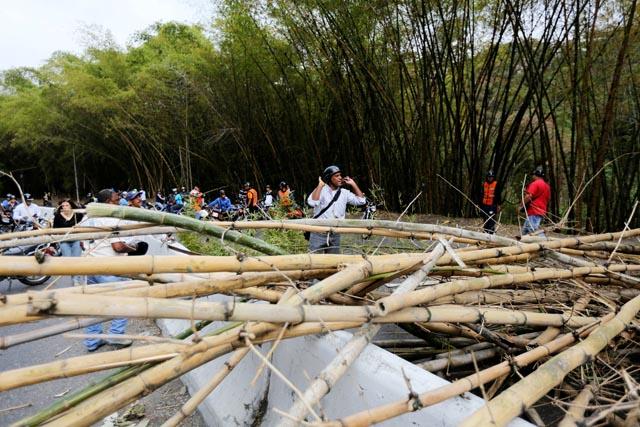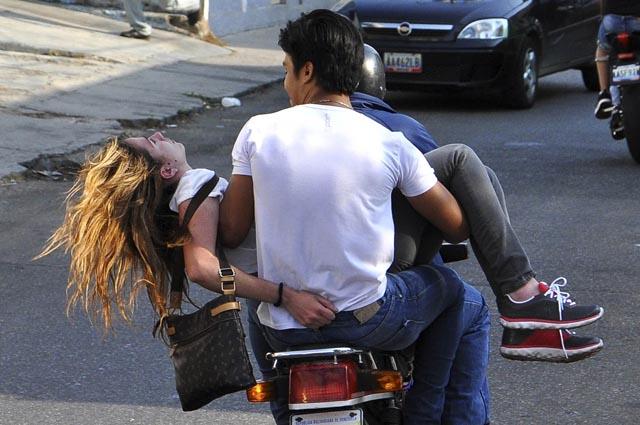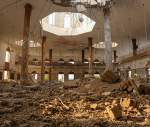You are here
Venezuela protests flare anew
By Reuters - Feb 24,2014 - Last updated at Feb 24,2014

CARACAS — Anti-government demonstrators set up barricades and started fires in Venezuela’s capital on Monday despite calls from within the opposition to rein in protests in which at least 12 people have died in the OPEC nation.
Traffic slowed to a crawl around Caracas and many people stayed at home, as protesters burned trash and piled debris along main avenues a day after opposition leader Henrique Capriles called on them to keep demonstrations peaceful.
“We know we’re bothering people but we have to wake up Venezuela!” student Pablo Herrera, 23, said next to a barricade in the affluent Los Palos Grandes district of Caracas.
Authorities in the convulsed border state of Tachira confirmed the latest death from the unrest: a man hit by a stray bullet watching a protest from the balcony of his apartment.
The most sustained unrest in Venezuela for a decade is the biggest challenge to President Nicolas Maduro’s 10-month-old government, though there is no sign it will topple him nor affect oil shipments from Latin America’s biggest exporter.
Capriles, 41, was invited to meet Maduro in the afternoon as part of a gathering of mayors and governors that could open up communications between the two sides but may not be able to stem the nearly two weeks of street violence.
He and other opposition figureheads are demanding that the government release imprisoned protest leader Leopoldo Lopez and about a dozen jailed student demonstrators.
They also want Maduro to disarm pro-government gangs and address national issues ranging from crime to shortages of basic products. Hardline student protesters, though, are demanding that Maduro step down, less than a year into his term.
The president, a 51-year-old former union activist who has made preserving Chavez’s legacy the centerpiece of his rule, accuses opponents of planning a coup backed by Washington.
Capriles, who has seen his leadership of the opposition upstaged by Lopez’s street activism, lashed Maduro for talking “rubbish” and said he was unsure if he would attend the meeting scheduled for the afternoon at the presidential palace.
Socialist governor speaks out
The governor of the turbulent state of Tachira, who belongs to the ruling party, on Monday criticised the government’s response to the protests and called for Lopez to be freed — an extremely unusual stance for a Socialist Party official.
“It’s a matter of peace; all of those in jail for political motives should be sent home,” said Jose Vielma, referring to Lopez and another well-known opposition-linked prisoner.
Socialist Party leaders have for years avoided making comments that could appear to be breaking away from the party line, making Vielma’s comment all the more uncommon.
The protests have hit the border state Tachira harder than any other, with gangs of student demonstrators now the de facto authorities in some parts of its principal cities.
Even though Maduro has sent in troops to restore order, transport is frequently disrupted by improvised roadblocks that charge tolls to those seeking passage and throw rocks at those who attempt to move on without paying.
Supermarkets in Tachira are opening only for several hours in the morning, with supplies of food limited because delivery trucks cannot get through.
The nationwide wave of protests began with sporadic demonstrations in Tachira’s capital of San Cristobal due to outrage over an attempted rape, sparking student protests around the region.
Lopez, a 42-year-old Harvard-educated economist and firebrand opposition leader, rode the coattails of those protests to create a nationwide effort called “La Salida” or “The Exit” meant to end Maduro’s rule.
Relatives of Lopez, who was arrested on Tuesday, said he was bearing up at Ramo Verde prison outside Caracas. “He’s strong. But he’s a prisoner, and for a mother, it’s devastating,” his mother Antonieta Mendoza de Lopez told Reuters.
The wave of violence has shifted attention away from economic troubles including inflation of 56 per cent, slowing growth, and shortages of staple goods such as milk and flour.
The opposition blames these problems on Chavez’s economic legacy of nationalisations, currency controls and constant confrontation with businesses.
They say socialism has crippled private enterprise and weakened state institutions while spawning a nepotistic elite that enriches itself with the country’s oil wealth.
Maduro calls it an “economic war” led by the opposition. The former bus driver calls himself the “son” of Chavez and has vowed to continue the generous public spending that helped reduce poverty and propelled the late president to repeated election victories over 14 years.
Related Articles
Opponents of Venezuela’s leftist government prepared for a mass protest rally in Caracas Saturday, a day after President Nicolas Maduro issued a surprise call for direct talks with the United States.
Venezuela marked the first anniversary of Hugo Chavez’s death Wednesday with a blend of solemn ceremonies, clashes and a break in relations with Panama over protests dogging his successor’s presidency.
Venezuela upped pressure on the opposition Wednesday after weeks of protests, arresting two mayors including one in the town where they started and seeking a probe of a prominent anti-government lawmaker.

















